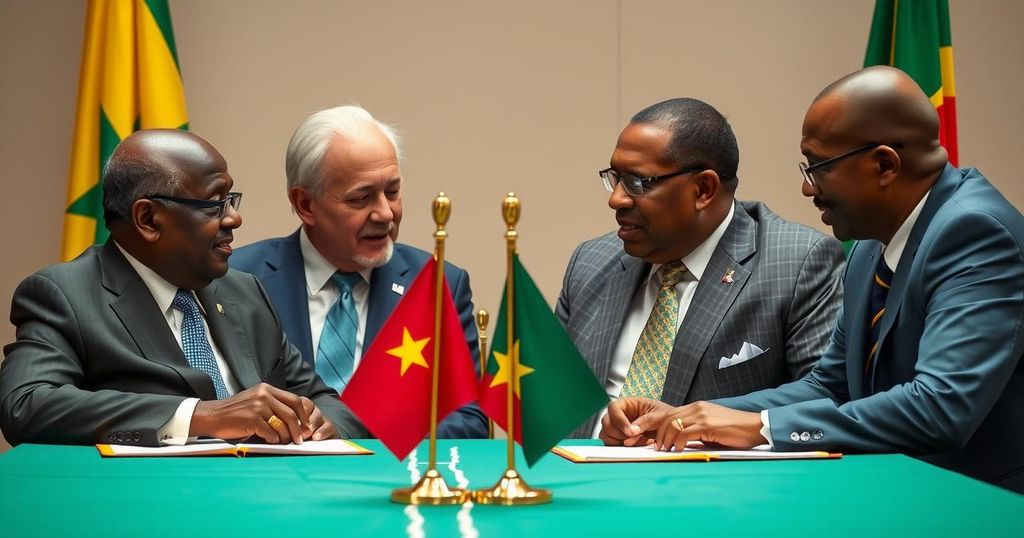Turkey Mediates Landmark Peace Agreement Between Ethiopia and Somalia

On December 11, 2024, Turkey mediated a pivotal peace agreement between Ethiopia and Somalia, marking its rising diplomatic influence. The agreement arose from tensions following Ethiopia’s controversial MoU with Somaliland, leading to regional alignments that necessitated external mediation. The resulting Ankara Declaration emphasizes sovereignty and cooperation, setting the stage for economic collaboration while addressing potential domestic challenges in Somalia and the complex recognition tensions involving Somaliland.
On December 11, 2024, Turkey facilitated a pivotal peace agreement between Ethiopia and Somalia, signifying its rising diplomatic influence in the region. This arrangement, emerging from high-level talks in Ankara, aims to rejuvenate cooperation following a year of strained relations. International support from entities such as the UN and the African Union has bolstered this declaration, which seeks to establish a framework for mutual progress between the nations.
The discord between Ethiopia and Somalia originated in January 2024 when Ethiopia signed a controversial Memorandum of Understanding (MoU) with Somaliland, granting it a maritime stretch that heightened fears within Somalia regarding potential recognition of Somaliland’s independence. This escalation forced Somalia to seek military support from regional allies like Egypt and Djibouti, leading to Ethiopia aligning itself with countries, including Uganda and Kenya. In response to this instability, Somalia demanded the withdrawal of Ethiopian troops by the end of 2024, coinciding with the expiration of the African Union Transition Mission mandate, which propelled the need for external mediation.
To mitigate tensions, Turkey initiated the ‘Ankara Process’ in July 2024, aiming to bring Ethiopian and Somali officials to the negotiating table. Following a series of discussions culminating in December 2024, both nations reaffirmed their respect for each other’s sovereignty and territorial integrity, establishing a commitment towards cooperative economic ventures. The agreement outlines a framework for technical negotiations to commence by February 2025, with the intention of finalizing commercial arrangements.
For Ethiopia, the agreement represents a strategic opening for Red Sea access and a route to economic recovery following the humanitarian impacts of the Tigray conflict, while Somalia views it as a chance to stabilize its security situation amid threats from Al Shabaab. However, these domestic agendas may face opposition from nationalist factions within Somalia who perceive these agreements as an infringement on its sovereignty. Furthermore, threats from Al Shabaab may hinder the government’s attempts to rally nationalist support for the accord.
The pursuit of international recognition by Somaliland adds complexity to this reconciliation effort. Newly elected President Abdirahman has intensified collaborations with Ethiopia, while potential shifts in U.S. policy regarding Somaliland’s recognition have implications for Somalia’s sovereignty. The dynamics of regional security, particularly concerning U.S. interests in countering Chinese influence, blur the prospects of an uncomplicated reconciliation process.
Moreover, France’s renewed interest in Ethiopia, epitomized by President Emmanuel Macron’s visit, indicates a cooperative potential regarding Ethiopia’s maritime aspirations—an ambition highlighted in a pre-existing agreement to enhance its naval capabilities, albeit hampered by previous geopolitical tensions. France’s involvement reflects its broader strategy to regain influence in a region increasingly wary of its historical presence.
Turkey’s mediation stands as a testament to its evolving diplomatic role in Africa, signaling both a reliable partnership for regional stabilization and potential involvement in further conflicts, such as the situation in Sudan. The success of the Ethiopia-Somalia Agreement will depend on all parties’ commitment to its principles, particularly in addressing domestic dissent in Somalia and Ethiopia’s cautious approach to bilateral relations. Overall, the Ankara Declaration has set a foundation for peace, yet its implementation will require careful management of regional sentiments and interests.
The geopolitical landscape of the Horn of Africa has been marked by historical tensions, particularly between Ethiopia and Somalia, stemming from territorial and recognition disputes. The roots of this conflict were exacerbated by Ethiopia’s engagement with Somaliland, a self-declared autonomous region within Somalia. The signing of a Memorandum of Understanding granting Ethiopia access to a strategic coastline sparked fears of Somaliland’s potential independence, which Somalia vehemently opposed, leading to a breakdown in bilateral relations. The subsequent alignment of regional powers further polarized the situation and heightened the need for diplomatic intervention. Turkey’s proactive role in mediating peace efforts illustrates its growing influence and ambition to serve as a strategic partner in African affairs, promoting stability and cooperation in a region rife with conflict.
The peace agreement mediated by Turkey between Ethiopia and Somalia signifies a significant diplomatic achievement, fostering hope for renewed cooperation in the Horn of Africa following a tumultuous period of conflict. While the accords lay the groundwork for mutual respect and economic collaboration, the execution of such agreements demands sustained commitment from both sides to navigate internal dissent and external pressures. The evolving dynamics of international recognition for Somaliland and the interests of global powers further complicate the landscape, necessitating careful diplomatic engagement to ensure long-lasting peace and stability in the region.
Original Source: www.idsa.in








